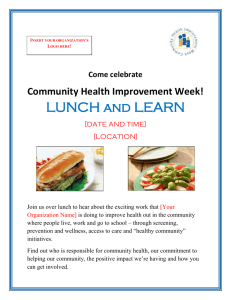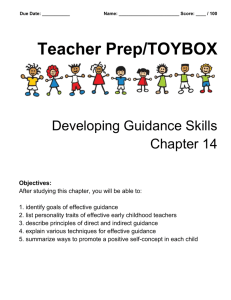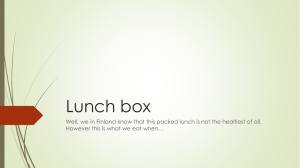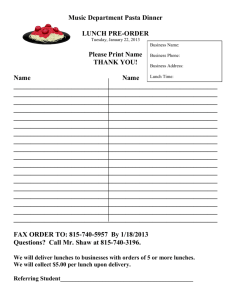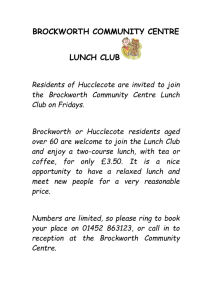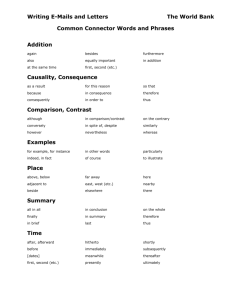File
advertisement
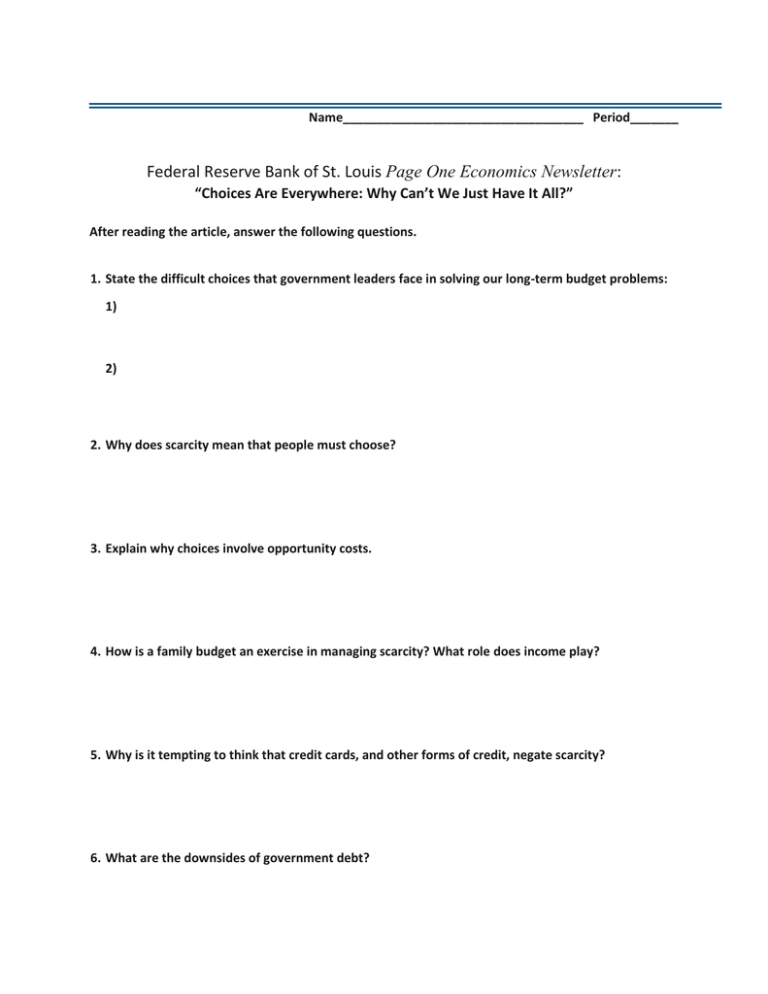
Name___________________________________ Period_______ Federal Reserve Bank of St. Louis Page One Economics Newsletter: “Choices Are Everywhere: Why Can’t We Just Have It All?” After reading the article, answer the following questions. 1. State the difficult choices that government leaders face in solving our long-term budget problems: 1) 2) 2. Why does scarcity mean that people must choose? 3. Explain why choices involve opportunity costs. 4. How is a family budget an exercise in managing scarcity? What role does income play? 5. Why is it tempting to think that credit cards, and other forms of credit, negate scarcity? 6. What are the downsides of government debt? Handout Name___________________________________ Period_______ Consider the Opportunity Cost Opportunity cost is a foundational concept in economics. It is also a key thinking skill in the practical art of daily decisionmaking. Unfortunately, people often fail to consider opportunity cost until they learn to use it as a thinking skill. Once you have mastered the idea of opportunity cost, you will think differently about all sorts of routine choices. The table shows a few examples. This: I’m tired. I think I will sleep in this morning. This new video game is awesome, and it’s only $40. Becomes this: If I sleep in this morning, then I give up the opportunity to go to chemistry class. This new video game is awesome, but if I spend $40 on it, I give up the opportunity to spend it on ______________ or save it for ______________. In the end, you might still decide to sleep in and buy the new video game, but recognizing the opportunity costs will increase your chances of making a rational decision. Free Lunch? Economists are fond of saying “There is no such thing as a free lunch.” Of course, they are not talking about lunches literally. In fact, many people miss the point of this phrase. Imagine Fred is walking to school when he notices a sign on the front lawn of the high school: “Free lunch here today at noon.” Fred is a little skeptical, but later that day he looks out the window and, sure enough, he sees a table with pizza and soda and a big sign that reads “Free.” But Fred remembers his teacher saying “There is no such thing as a free lunch.” Fred decides to ask his best friend, Frank, why the lunch is not free. Frank shrugs and responds, “Someone had to pay for it.” While this is true, the real question is this: Why is the lunch not free for Fred? What do you think? Consider this scenario: You received $50 from your grandmother for your birthday. You decide to buy some new clothes. Because the money was a gift, you believe your new clothes are free. You could have, however, used the $50 to buy the new calculator required for your math class next semester. So, are the clothes you bought really free? You Decide: Opportunity Cost or Consequence? The difference between opportunity costs and consequences can be confusing. Remember that the opportunity cost is the value of the next-best alternative when a decision is made; it's what is given up. A consequence is a result or effect of an action or decision, and consequences may be positive or negative. While opportunity cost and consequences sound like similar ideas, they are not the same. One way to think about the difference is to remember that the opportunity cost occurs when the decision is made, while the consequences lie in the future. Imagine you decide to go to college after you graduate from high school. If you choose to go to college, you give up the opportunity to get a full-time job—this is part of the opportunity cost of attending college. The consequences of your decision lie in the future, such as the higher income you will likely receive with a college degree. • Choice: Go to college • Opportunity cost: Full-time employment • Consequence: Higher income in the future Identify the opportunity cost and the consequence in this scenario: You have one dollar, which you have decided to use to buy a candy bar. Your favorite candy bar is GooeyNut followed closely by LuvChoc. Your dentist has warned you about your candy habits; he is fond of saying “Forget the Alamo, remember the Enamel.” • Choice: ______________________________________________________ • Opportunity cost: _____________________________________________ Consequence: ________________________________________________
